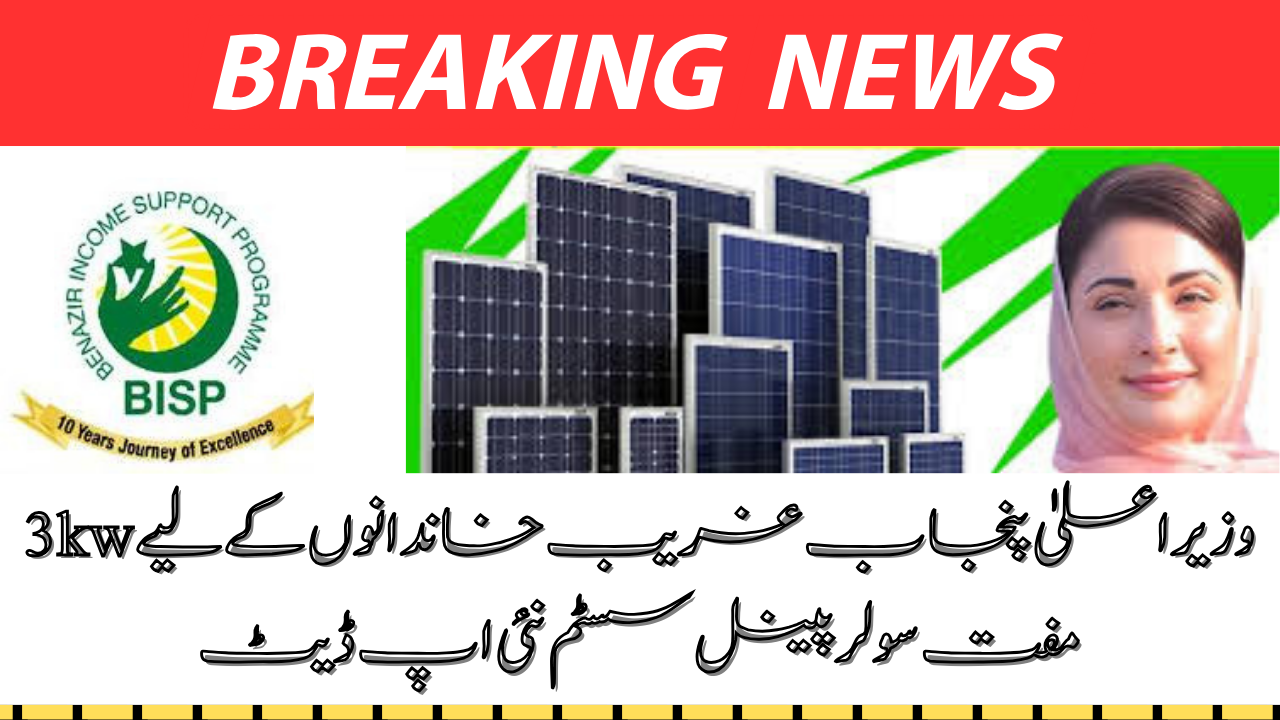3kW Free Solar Panel System
Punjab, Pakistan – July 2024: In a groundbreaking initiative aimed at uplifting the socio-economic status of low-income families, the Government of Punjab, under the leadership of Chief Minister Maryam Nawaz Sharif, has announced the launch of the 3kW Free Solar Panel System program. This initiative is part of the broader Punjab Solar Energy Strategy, which aims to promote renewable energy, reduce electricity costs for the underprivileged, and contribute to environmental sustainability.
Addressing Energy Poverty
The primary objective of the 3kW Free Solar Panel System program is to combat energy poverty among low-income households. Energy poverty, characterized by a lack of access to affordable and reliable electricity, significantly impacts the quality of life. It limits access to essential services such as education, healthcare, and economic opportunities. By providing free solar panels, the Punjab government aims to ensure that even the poorest households have access to clean, sustainable, and reliable energy.
Eligibility and Application Process
To ensure that the program reaches those who need it the most, the Punjab government has laid out clear eligibility criteria. Families with a monthly income below a certain threshold, as defined by the government, will be eligible to apply. Priority will be given to households in rural areas, where access to the national grid is often limited or non-existent.
The application process has been designed to be straightforward and accessible. Eligible families can apply through the Punjab Energy Department’s official website or through designated community centers. The application form requires basic information such as the applicant’s CNIC number, household income details, and proof of residence. The government has also set up help desks in various districts to assist applicants in completing the process.
Installation and Maintenance
Once approved, the solar panels will be installed by certified technicians to ensure safety and efficiency. The 3kW solar panel system is designed to meet the basic energy needs of an average household, including lighting, fans, and small appliances. The installation process will be monitored by the Punjab Energy Department to ensure quality control.
To address concerns about maintenance and long-term sustainability, the government has partnered with local companies to provide free maintenance services for the first three years. This includes regular check-ups, cleaning, and any necessary repairs. After the initial three years, families will be provided with training on basic maintenance to ensure the longevity of the system.
Environmental and Economic Benefits
The 3kW Free Solar Panel System program is not only a social welfare initiative but also an environmental one. By promoting the use of renewable energy, the Punjab government is taking significant steps towards reducing the province’s carbon footprint. Solar energy is a clean and sustainable source of power that does not emit greenhouse gases, thereby contributing to the global fight against climate change.
Economically, the program is expected to bring substantial benefits. For low-income families, the reduction in electricity bills will free up resources that can be used for other essential needs such as education, healthcare, and food. Additionally, the program is expected to create jobs in the renewable energy sector, from manufacturing and installation to maintenance and support services.
Community Empowerment and Education
A crucial component of the program is community empowerment through education. The Punjab government has launched an awareness campaign to educate the public about the benefits of solar energy and how to effectively utilize and maintain the solar panels. Workshops and seminars will be conducted in collaboration with local NGOs and community leaders to ensure maximum outreach.
The program also aims to involve women in the renewable energy sector. Special training sessions will be organized for women to learn about solar technology, installation, and maintenance. By empowering women with technical skills, the program hopes to create a more inclusive and skilled workforce.
Future Prospects and Expansion
The 3kW Free Solar Panel System program is just the beginning of Punjab’s ambitious plans for renewable energy. The government has outlined a roadmap for the expansion of the program to cover more households in the coming years. Future phases may include larger capacity solar panels and the integration of energy storage solutions to ensure a continuous power supply.
The success of this program will also pave the way for other provinces in Pakistan to adopt similar initiatives. By setting a precedent, Punjab is positioning itself as a leader in renewable energy and social welfare.

Challenges and Mitigation
While the program is promising, it is not without challenges. The initial cost of solar panels and installation is high, and there is a need for substantial government funding. To mitigate this, the Punjab government is seeking partnerships with international donors, non-governmental organizations, and the private sector.
Another challenge is ensuring the quality and durability of the solar panels. The government has implemented strict quality control measures and is working with reputable suppliers to ensure that the panels meet international standards. Regular monitoring and evaluation will be conducted to address any issues that arise.
Conclusion
The 3kW Free Solar Panel System program is a landmark initiative by the Punjab government that addresses multiple facets of development – social welfare, economic upliftment, and environmental sustainability. By providing free solar panels to low-income families, the government is not only improving their quality of life but also promoting a cleaner and greener future for Punjab. This initiative, under the visionary leadership of Chief Minister Maryam Nawaz Sharif, exemplifies a commitment to inclusive growth and sustainable development
